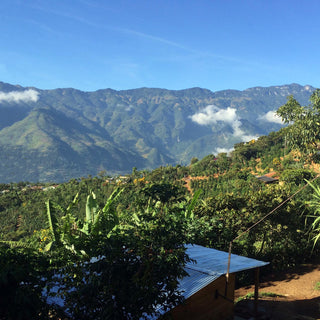- Filter
Jungle Berry
GRAPE CANDY | VIOLETS | CARAMEL
This coffee is for all you berry lovers out there. It's juicy, sweet and complex. The roast tends to be on the lighter side, highlighting juicyness and making this one of the most lively coffees on our lineup.
The coffee in Jungle Berry right now comes from the Ndia-ini factory in Kenya. You can read more below.
Adding product to your cart

ABOUT THE COFFEE
Ndia-ini was formerly part of the Rumukia Farmer’s Cooperative Society, who I’ve bought from for over a decade, but Ndia-ini itself is a new purchase for us. I’m excited for them this season because the profile is unique and interesting. It’s both candy-like and floral at the same time, a combination that is very rare and worth celebrating and enthusiastically enjoying.
A bit about Ndia-ini: they serve 1512 members and 558 of those delivered cherry this past harvest. They received 247 metric tonnes of cherry, which translates to roughly 600 bags of coffee. Their variety mix is 70 percent SL28 and SL34, 10 percent Batian, and 20 percent Ruiru 11.
The story of Ndia-ini is a reminder of how difficult it is to keep larger co-ops together over the long run. Ndia-ini was part of Rumukia, who operated their own dry mill, but the co-op eventually ran into financial challenges and couldn’t hold together. The good news for us, and for you, is that Ndia-ini began working with the Othaya dry mill to finish processing their coffee, and that partnership really locks in the quality.
The Othaya dry mill excels because of its naturally high altitude, which provides cool storage conditions, and because of their finely tuned and precise processing equipment. Othaya also helped found a cooperative-owned exporter called Kenya Cooperative Coffee Exporters (KCCE).
What I love about KCCE is their fully transparent pricing structure. They take a fixed 2 percent fee from the total price paid by buyers. This stands in clear contrast to other marketing agents and exporters who take varying, non-transparent amounts from each sale.
– Phil

PAIRS WELL WITH
I love coffee from East Africa and this one didn't disappoint. Actually it's the best, the coffee itself and also the roasting, no "dark", i.e.burnt nonsense. Thanks, P&S, for keeping standards
This review is based upon the Oviedo family grown Don Joel honey processed and not the current Evin Moreno, which is a double-fermented washed process. I will cup and review the latter sometime in the near future.
Notably sweet, Demera sugar comes to mind, real Demerara not Rogers. This becomes very apparent as the coffee cools. It is brightly acidic, citrusy in character. The flavour profile is masked until it cools a bit and, at least for me, takes on a caramelized berry experience on the palate. The finish is long and sweet.
Some may criticize my method, but I don't care. My water to bean ratio is 10 to 1 in a French press, with a slightly coarser than recommended grind. Water off boiling for 2 minutes, no bloom, and a brew of 4 minutes with no stir before plunging. It produces what I see as a near flawless velvety smooth cup.
It is exactly what I would expect of an SL28, honey processed, and grown in Central America.
To clarify, I am a member of the Specialty Coffee Association but am not connected to Phil & Sebastian and my review is unbiased.
Yep sure enjoyed it!
First time I tried Mystic Melon and Jungle Berry at the same time to compare, I found Jungle Berry more "herbal" and Mystic Melon more malted. Not sure if that makes any sense but I loved both!
Really good, will order again.


